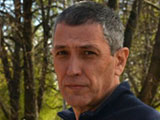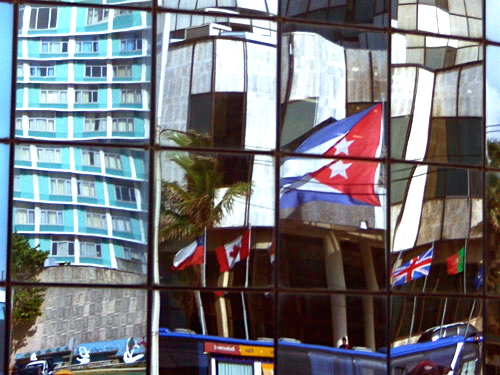Maduro Out in the World, Havana
by Israel Centeno and translated by Kelly Harrison / May 7, 2013 / No comments
Maduro travels to Havana just as he is accused of electoral fraud. Why?
With all of our modern revolutions in telecommunications and video conferencing, and with a satellite orbiting the Earth that can be used for more than just broadcasting radio and television channels (or electoral information), one might question why exactly Maduro went to Havana at the end of April. Why go on this trip when there are still so many explanations needed back home? Was it because the new president needed a hug from the old Cuban dictator and caudillo emeritus? Did he need to hear a tender paternal phrase or comforting expression, or to look into the ancient eyes of his teachers, without there being a screen of fatherly pride between them? Or did he simply need to get away, leaving the stage open for the militant Tibisay Lucena, president of the National Electoral Council (CNE), so she can comfortably play her role in the whole illegal business? After all, in the end it falls on Lucena, a member of the United Socialist Party of Venezuela and head of the electoral commission, to talk about the transparency of the Venezuelan electoral process and refuse an audit under the terms demanded by the opposition. Ballot papers will simply be counted without verifying them against the electoral register, a pointless exercise of counting sheep to scare away the ghosts of insomnia that have shaken the national conscience.

- From his lonely watch post Albert Camus asked who among us has not experienced exile yet still managed to preserve a spark of fire in their soul. “We’re all alone,” Natalia Sedova cried in exile on hearing of her husband Leon Trotsky’s affair with Frida Kahlo. In his novel Night Watch, Stephen Koch follows the incestuous love affair of David and Harriet, wealthy siblings watching the world from their solitary exile. Koch’s writing, Camus’s theories, and Trotsky’s affair all come back to exile and lead me to reflect on the human condition. From my own vantage point, my Night Watch, I will reflect on my questions of exile, writing, and the human condition.

- Israel Centeno was born in 1958 in Caracas, Venezuela, and currently lives in Pittsburgh as a Writer-in-Residence with City of Asylum/Pittsburgh. He writes both novels and short stories, and also works as an editor and professor of literature. He has published nine books in Venezuela and three in Spain.
Electoral fraud has been committed. But the opposition has few resources to overturn it. The regime employs the usual tools, polarizing the scene, converting tactics into a fight between opposites: Left and right, fascism and socialism, rich and poor. Once again, they rely on exhausting their adversaries’ efforts with the dishonest, legalistic labyrinths of a regime designed by mess and confusion, interpreted by submissive institutions. You don’t have to be psychic to know that the Supreme Court of Justice will not find any reason to challenge the results and then, after that, there are only the international courts and the celestial court to conquer.
While thinking about this I happened to read a tweet by Yoani Sánchez in which she wondered whether Maduro’s first visit to Havana would inject oxygen back into the dictatorship of the old revolutionaries. Well, in reality, Yoani, my respected friend, the oxygen never ran out, and I doubt whether it has ever been in danger of doing so—not while Hugo Chávez was alive, nor while he was in recovery, nor during the electoral process. The Castros were never going to lose this election. All of their knowledge and networks, as has been demonstrated recently, have been at the service of the apprentice, Nicolas Maduro.
The alliance with Cuba, and even with Argentina, came as no surprise. But the blessings from Chile and Colombia caused some confusion because of their leaders’ ideological alignments. Nevertheless, maybe Maduro could be an excellent interlocutor for Evo Morales and the issues in the Chilean altiplano, in particular the matter of access to the sea. And the Juan Manuel Santos camp guarantees that there will be no changes with regard to the guerrillas, the FARC, on the vast flood plain just outside Colombian borders; they’ll keep the peace and sustain growth in the name of all the just causes of the universe and beyond.
If we drew up an inventory, we would find reasons to justify supporting Iran while supporting France. But we don’t have the space to talk about that in this column. Venezuela has an infinite capacity to provide oxygen for the world, partly through being an entirely dependent country—90% of what is consumed is imported—despite having million-dollar resources in oil income. On the one hand, geopolitics has granted Venezuela the role of managing the most diverse conflicts in the region, ranging from drug trafficking and money laundering to the abstract concepts of peace and war between irreconcilable forces. On the other hand, all of this comes at a cost to her institutionality, her democracy, and her sovereignty.





